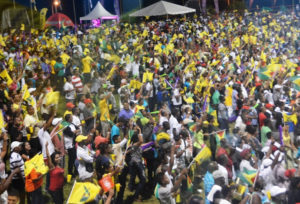It has now been confirmed that Guyana will host seven of the T20 matches in the 2018 Edition of CPL, including two of the playoff games. The historic announcement that Guyana was given the opportunity to host playoffs was made on Wednesday by CPL’s Chief Operating Officer (COO), Pete Russell.
Now in its seventh year, the CPL has been truly established as one of the leading T20 leagues in the world, and compares favourably with the likes of the Indian Premier League (IPL) and the Australian Big Bash League (BBL). In addition to the high level of entertainment provided for families, many stakeholders in the Caribbean — including governments and private sector bodies — are well aware of the huge economic potential the CPL has for host countries and the region as a whole.

Hosting of the CPL games in Guyana is the kind of intervention that is needed to give a much needed boost to the country’s ailing economy. It is well known that, over the past two years or so, several businesses have been complaining of poor sales; companies have had to lay off workers, and some companies are even closing down, due to unprofitability.
Guyana, through the CPL, has benefited significantly from hosting the event, since the inception of the tournament in 2013. It was reported in the media that the CPL’s economic impact on Guyana in 2017 was around US$14,183,035. This figure has been arrived at by using organiser spend, visitor spend, and media value, and was calculated for Hero CPL by world-renowned researchers SMG Insight.
In addition to the huge economic impact over the years, hundreds of jobs were created, hotel rooms were booked, and there was a huge trickledown effect which saw many other sectors benefiting. There was also significant value for Guyana in terms of the country being given coverage through the television broadcast of the event. Based on official statistics released, the CPL spent just under US$ 1million in Guyana during the 2017 event, with over 40% of that figure going to local staff and suppliers. In essence, the CPL games are a good example of the tremendous benefits that could be derived from a sporting event of such magnitude.
The fact that seven games have been confirmed for Guyana is indeed good news for fans. It should be pointed out that destinations like Trinidad and Tobago and the USA had expressed interest in hosting the Playoffs; however, according to Russell, the decision to bring the two matches to Guyana was a fairly easy one. Russell was quoted in the media as saying: “We’re obviously delighted because of the fan base we already have in Guyana. We think it’s due reward for the support that the fans have shown us over the past five years. So we’re very excited about the games, we obviously think they’re going to be sellout matches.”
CPL has indeed been a success story, not only as it relates to the development of cricket in Guyana and the region, but because of the potential for growth and the ability to create the kind of opportunities that would seek to improve the lives of citizens.
Each year, the National Stadium at Providence, home ground of the Guyana Amazon Warriors, attracts sold out crowds. Also, with tournaments such as these, it is not only the sold out stadiums that warrant the prestige; it is a chance to showcase one’s country on the global market, since television viewership would usually span each continent.
It is hoped that all stakeholders — including the Government, private sector bodies, small business owners and so on — would once again capitalise on the many opportunities available due hosting these matches. More particularly, the tourism sector must come up with a sound plan regarding how it intends to take advantage of the thousands of returning Guyanese and other overseas visitors who will be there for the games.
Related posts
-

Lindender Taneila Croal shares her journey as a young entrepreneur
By Utamu Belle At 26 years old, Lindener Taneila Croal has her eyes set on living... -

Poetry is my way of expressing what I’ve been through or what I am going through – Kelwin Gittens
By Lakhram Bhagirat Sometimes finding the right word to ascribe to your feelings of intimacy and... -

This International Women’s Day, Let’s focus on
equity over equality By Marlee Silva for ABC News International Women’s Day was a rather foreign...
